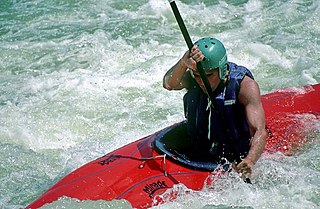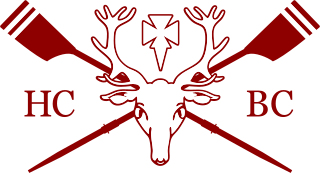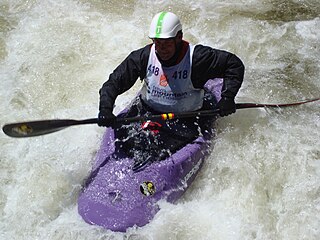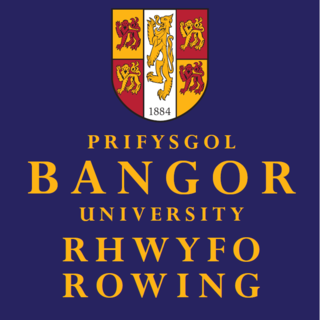
A kayak is a small, narrow human-powered watercraft typically propelled by means of a long, double-bladed paddle. The word kayak originates from the Greenlandic word qajaq.
A folding kayak is a direct descendant of the original Inuit kayak made of animal skins stretched over frames made from wood and bones. A modern folder has a collapsible frame made of some combination of wood, aluminium and plastic, and a skin made of a tough fabric with a waterproof coating. Many have integral air chambers inside the hull, making them virtually unsinkable.
Lola Cars International Ltd. was a British race car engineering company in operation from 1958 to 2012. The company was founded by Eric Broadley in Bromley, England, before moving to new premises in Slough, Buckinghamshire and finally Huntingdon, Cambridgeshire, and endured for more than fifty years to become one of the oldest and largest manufacturers of racing cars in the world. Lola Cars started by building small front-engined sports cars, and branched out into Formula Junior cars before diversifying into a wider range of sporting vehicles.

Lake Banook is a freshwater lake located in Dartmouth within the Halifax Regional Municipality in Nova Scotia, Canada. It is home to three sprint canoe and kayak clubs, two rowing clubs, and a dragon boat club. It also has a claim to be the birthplace of ice hockey.
British Canoeing is a national governing body for canoeing in the United Kingdom. Established in 1936 as the British Canoe Union, in 2000 it federalised to become the umbrella organisation for the home nation associations in Scotland, Wales and Northern Ireland. In 2015 it took on the name British Canoeing and amalgamated the former BCU, Canoe England and GB Canoeing.

A sprint canoe is a canoe used in International Canoe Federation canoe sprint. It is an open boat propelled by one, two or four paddlers from a kneeling position, using single-bladed paddles. The difficulty of balance can depend on how wide or narrow the canoe is, although regularly the less contact a canoe has with the water the faster it goes. This makes the narrower boats much faster and popular when it comes to racing.

Hertford College Boat Club (HCBC) is a rowing club for members of Hertford College, Oxford. It is based in the Longbridges boathouse on the Isis, which is owned by the college and shared with St Hilda's, St Catz, Green Templeton, and Mansfield.

The baidarka or Aleutian kayak is a watercraft consisting of soft skin over a rigid space frame. Its initial design was created by the native Aleut people of the Aleutian Islands. The Aleut people were surrounded by treacherous waters and required water transportation and a hunting vessel. Due to the geography and climate of the Aleutian Islands, trees and wood were in scarce supply and the people relied primarily on driftwood to create the framework of the kayak, which was covered with the skins of sea mammals. Two types of boats were created, one with a covered deck that was used as a hunting kayak, and another that was open and capable of carrying goods and people from one island to another.

Sunbury Lock is a lock complex of the River Thames in England near Walton-on-Thames in north-west Surrey, the third lowest of forty four on the non-tidal reaches. The complex adjoins the right, southern bank about 1⁄2 mile (0.80 km) downstream of the Weir Hotel.

Eric "EJ" Jackson is a world-champion freestyle kayaker, kayak designer, slalom kayaker, founder of Jackson Kayak, and a Professional Bass Tournament angler on the FLW Tour.
Huntingdon is a lightly populated locality in the Canterbury region of New Zealand's South Island. It is situated on the southern bank of the Ashburton River / Hakatere, south of Ashburton. Other nearby settlements include Willowby to the west, Wheatstone, Flemington, and Ashton to the south, and Wakanui to the east across the river.

Bangor University Boat Club(BUBC) is the rowing club of Bangor University run for and by the university's students. The club's home water is Llyn Padarn in the nearby village of Llanberis, approximately 20 minutes outside Bangor, Gwynedd, Wales.
Wim Van Belleghem is a Belgian former rower from Koolkerke near Bruges. He won the World Championships lightweight class single scull in 1987. After Polydore Veirman of the Royal Club Nautique de Gand, and Eveline Peleman of Royal Sport Nautique de Gand he is the most important Belgian single sculler of all time.

Canoeing – recreational boating activity or paddle sport in which you kneel or sit facing forward in an open or closed-decked canoe, and propel yourself with a single-bladed paddle, under your own power.

Human-powered watercraft are watercraft propelled only by human power, instead of being propelled by wind power or an engine.
The 87th Boat Race took place on 6 April 1935. Held annually, the Boat Race is a side-by-side rowing race between crews from the Universities of Oxford and Cambridge along the River Thames. Umpired by former Oxford rower Robert Bourne, Cambridge won by four and a half lengths in a time of 19 minutes 48 seconds. The record twelfth consecutive victory took the overall record in the event to 46–40 in Cambridge's favour.
Confluence Outdoor is an American manufacturer of kayaks, canoes, and related accessories. The company comprises seven separate brands which each specialize in paddling sport boats or accessories.
The 82nd Boat Race took place on 12 April 1930. Held annually, the Boat Race is a side-by-side rowing race between crews from the Universities of Oxford and Cambridge along the River Thames. In a race umpired by former Oxford rower Charles Burnell, Cambridge won by two lengths in a time of 19 minutes 9 seconds. Their seventh consecutive victory, it took the overall record to 41–40 in their favour, the first time for 68 years that they held the lead in the event.

Nathan Benderson Park, previously known as North Metro Park and Cooper Creek Park, is a 600-acre (240 ha) park in the U.S. state of Florida, owned by Sarasota County. It incorporates a 400-acre (160 ha) artificial lake in northern Sarasota County, directly south of the Manatee County county line, west of Interstate 75. The lake is a rowing venue and hosted the 2017 World Rowing Championships.











